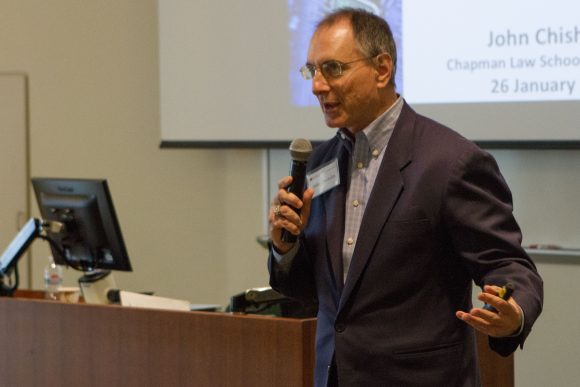Chapman Law Review Symposium 2018 Proponents of SEZs seek to seize opportunities
January 29, 2018
From the glittering skyscrapers of Dubai to the bustling commerce of the ports of Los Angeles and Long Beach, special zones that operate under different economic rules than the areas around them are a familiar global phenomenon.
Yet new types of these generally duty-free zones are emerging, creating dramatic experiments in government that inspired the topic for the Chapman Law Review Symposium 2018, “Special Jurisdictions Within and Outside of the United States,” on Jan. 26 at the Dale E. Fowler School of Law.
Many entrepreneurs and political idealists seeking lower taxes and less regulation are interested in ventures involving Special Economic Zones, or SEZs, with unique government frameworks. Examples around the world include a planned floating startup society in the waters of French Polynesia and the Honduran government’s proposed Zones for Employment and Economic Development — known as ZEDEs for their Spanish acronym.

John Chisholm, a Silicon Valley entrepreneur, speaks at the Chapman Law Review Symposium 2018. Photo/Amanda Galemmo ’20.
“We’re in this kind of Cambrian age of zones,” said panelist Tom W. Bell, Fowler professor of law and author of a new book on special jurisdictions, Your Next Government? From the Nation State to Stateless Nations. “There are going to be mistakes, but the point is, there’s a lot of experimentation in governance going on now. It’s really exciting for people who do the law.”
Seeking a new Silicon Valley
Keynote speaker John Chisholm, a Silicon Valley entrepreneur and angel investor, addressed law students and legal professionals in a talk titled “Design the Optimal Legal System for Your SEZ.”
“Everywhere I go around the world, people ask, ‘How can I create another Silicon Valley?’” said Chisholm, a member of MIT’s board of trustees who holds bachelor’s and master’s degrees from the university as well as an MBA from Harvard Business School. He also is the author of the entrepreneurship guide Unleash Your Inner Company.
Although the Silicon Valley is not an SEZ, entrepreneurs are seeking to recreate the phenomenon of the business incubator that evolved in Northern California. Among Chisholm’s recommendations for policymakers establishing SEZs were adopting common law traditions with statutes that are “responsive not prescriptive,” aiming for low tax rates and light regulation, seeking long-term viability instead of luring investors with short-term tax incentives, and not trying to “pick winners” but creating an environment for all entrepreneurs.
Other questions the symposium sought to consider included the issue of how SEZs fit within conventional models of state authority, and whether Foreign Trade Zones – as SEZs are known in the U.S. – raise constitutional issues. It also aimed to weigh whether the U.S. should reconsider the surging popularity of the country’s more than 200 FTZs or leverage their success.
From ports and airports to floating startups
The law review event, led by senior symposium editor Cindy Park (J.D. ’18), included morning remarks on Foreign Trade Zones by Lotta Moberg, Ph.D., author of the book, The Political Economy of Special Economic Zones, followed by a discussion between Moberg and Fowler professor of law Deepa Badrinarayana.

Fowler Prof. Tom Bell Photo/Donald Kochan
An afternoon panel on SEZs and international law moderated by Fowler professor of law Lan Cao featured Michael Castle Miller, founder of the nonprofit Refugee Cities, and Bell, who addressed ways that special international zones may infringe on the rights and liberties of refugees. In a side note, in addition to his role at Fowler, Bell is a legal consultant to Blue Frontiers, a company formed to build and administer the startup islands the French Polynesian government authorized in January in an agreement with the Seasteading Institute. The target for the first islands is 2020.
The symposium’s final session considering the future of SEZs featured Mark Frazier, chairman of the Startup Societies Foundation, and Sam Mulopulos, an expert on international trade, banking, housing, technology and communications with extensive Capitol Hill experience. It was moderated by Bell.
The global proliferation of SEZs could create employment opportunities for lawyers, some participants and attendees noted during the question-and-answer session after Chisholm’s keynote speech. Joe McKinney, CEO of the Startup Societies Foundation, said potential legal roles included drafting legislation, negotiating with governments, working with private developers or negotiating with businesses.
Display image at top/Rendering of a proposed floating SEZ planned for the waters of French Polynesia by the Seasteading Institute and builder Blue Frontiers. (Courtesy of Blue Frontiers)


